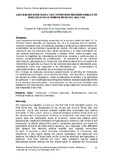| dc.rights.license | http://creativecommons.org/licenses/by-nc-sa/3.0/ve/ | |
| dc.contributor.author | Pacheco Troconis, Germán | |
| dc.date.accessioned | 2010-06-22T20:57:06Z | |
| dc.date.available | 2010-06-22T20:57:06Z | |
| dc.date.issued | 2010-06-22T20:57:06Z | |
| dc.identifier.issn | En trámite por el ISDS | es_VE |
| dc.identifier.uri | http://www.saber.ula.ve/handle/123456789/31272 | |
| dc.description.abstract | Las coyunturas internacionales acaecidas en la primera mitad del siglo XX: la Primera Guerra Mundial, la Depresión del 29 y la Segunda Guerra Mundial, tuvieron consecuencias económicas, sociales y políticas que transformaron en profundidad las economías y naciones del mundo. En este contexto se busca establecer las vinculaciones entre estas coyunturas y el desenvolvimiento de las Ciencias Agrícolas en Venezuela, y mostrar cómo estos sucesos que tuvieron la magnitud de cataclismos económicos, sociales y políticos para el mundo, paradójicamente se constituyeron en impulsores de las Ciencias Agrícolas en
Latinoamérica y Venezuela Sus efectos relevaron la necesidad de modernizar la agricultura y hacer de las Ciencias Agrícolas un instrumento para adelantarla, como una respuesta a las dificultades que condicionaban la estabilidad política y afectaban las economías nacionales. En el trabajo es realizada una breve caracterización económica de Venezuela, con referencias a la región en el período abordado; son descritos y analizados los efectos de estas coyunturas sobre la estructura económica y la agricultura en particular. Y son reseñadas las principales medidas estatales aplicadas frente a los
sucesos internacionales, profundizando en las acciones tomadas para establecer las Ciencias Agrícolas y modernizar la agricultura en Venezuela como una respuesta a las crisis. | es_VE |
| dc.language.iso | es | es_VE |
| dc.rights | info:eu-repo/semantics/openAccess | |
| dc.subject | Ciencias agrícolas | es_VE |
| dc.subject | Modernización agrícola | es_VE |
| dc.subject | Políticas públicas | es_VE |
| dc.subject | Historia económica | es_VE |
| dc.title | Las ciencias agrícolas y las coyunturas internacionales en Venezuela en la primera mitad del siglo XX | es_VE |
| dc.type | info:eu-repo/semantics/article | |
| dc.description.abstract1 | The international situation occurring in the first half of the twentieth century: the First World War, the Depression of the 29 and the Second World War, had economic, social and political in-depth transformed economies and nations worldwide. In this context, seeks to establish linkages between these joints and the development of Agricultural Sciences in Venezuela, and show how these events were the cataclysmic scale of economic, social and political world,
paradoxically constituted promoters of Agricultural Sciences in Latin America and Venezuela. Its effects relieved the need to modernize agriculture and make the Agricultural Sciences an instrument to advance, as a response to the difficulties that allowed the affected political stability and national economies. At work, it provides a brief economic characterization of Venezuela, with references to the region during the period addressed, are described and analyzed the effects of these joints on the economic structure and agriculture in particular. And they outlined the main state measures applied against international events, delving into the actions taken to establish the Agricultural Sciences and modernize agriculture in Venezuela as a response to the crisis. | es_VE |
| dc.description.colacion | 13-30 | es_VE |
| dc.description.email | pachecogerman@hotmail.com, gerpa@cantv.net | es_VE |
| dc.description.frecuencia | semestral | es_VE |
| dc.identifier.depositolegal | PPI200302ME3529 | es_VE |
| dc.publisher.pais | Venezuela | es_VE |
| dc.subject.keywords | Agricultural sciences | es_VE |
| dc.subject.keywords | Agricultural modernization | es_VE |
| dc.subject.keywords | Public policy | es_VE |
| dc.subject.keywords | Economic history | es_VE |
| dc.subject.publicacionelectronica | Revista Bitácora-e | es_VE |
| dc.subject.seccion | Revista Bitácora-e: Artículos | es_VE |
| dc.subject.thematiccategory | Artes y Humanidades | es_VE |
| dc.subject.tipo | Revistas | es_VE |
| dc.type.media | Texto | es_VE |



